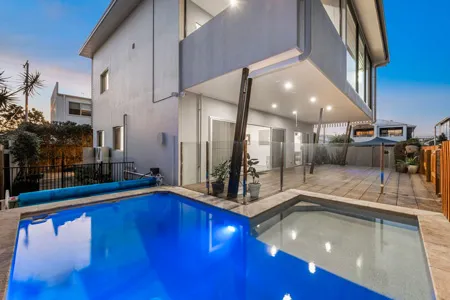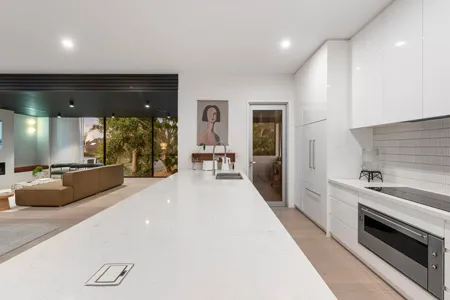Home renovation overcapitalising can sneak up on you faster than you’d expect. Gold Coast homeowners poured $275.6 million into home renovations in 2024—a 40% increase from 2018-19 and almost double the amount spent ten years ago. The renovation surge happened in part due to COVID-19, the urban migration from down south, and the influence of popular shows like The Block. This trend has led many homeowners down a path that could get pricey, but not as much as new home construction has risen in cost. (ref: Renovation Domination: decline in new builds while home renovations surge.)
Property overcapitalising happens when renovation costs exceed what you can recover from selling your home. Most experts suggest limiting improvement costs to no more than 10 – 20% of your home’s total value. Some renovations pay off—like the $850,000 property sold for nearly $1,500,000 after $370,000 in improvements. Your success depends on location and market conditions. So, avoiding overcapitalisation needs careful planning and market knowledge.
Let’s explore seven hidden warning signs of overcapitalising renovations and practical strategies that add real value to your property instead of draining your wallet. Keep in mind that breaking these “rules” might work to your advantage in certain situations.
What is overcapitalising on your home?
“Over capitalisation means to improve a property beyond its resale value, in other words it means that you spend too much money on the renovations of your property and are not able to recoup this money if you decide to sell it.” — LJ Hooker, Leading real estate franchise in Australia and New Zealand
Overcapitalising occurs when home improvement costs exceed the value they add to a property. Property owners and renovation enthusiasts make this financial mistake quite often.
Ground examples and meaning
You overcapitalise when your property improvements go beyond its resale value. Here’s a clear picture: you buy a home for $1,000,000 and put $500,000 into a fancy outdoor kitchen with timber decking and landscaping. The property’s value won’t automatically jump to $1,600,000. Similar homes in your area might sell for $1,25,000 at most. Your impressive improvements won’t push the selling price past this ceiling—you’ll lose $250,000.
These examples show classic overcapitalisation:
- A marble pool with gold-leafed angel fountains and adjoining sauna sits in a modest outer-city suburb
- Expensive features stand out too much in a less costly area
- Home improvements that go way beyond what’s normal for the neighbourhood
Experts suggest a simple rule: keep your renovation costs under 10% of your property’s value to avoid overcapitalising.
The bigger picture

Market conditions in late 2023 make overcapitalisation risks even bigger. Westpac’s chief economist predicts property prices will drop 7% next year and another 5% in 2024, making renovation timing crucial. Today, 2025, the data show more home renovations are being done on the Goldy than in previous years, and with 40% of all budget approvals being for renovations, now might be the right time to consider a realistic budget-driven renovation.
Neighbourhood comparisons play a massive role in property valuation. Each area has a median sale price and upper limits that can change significantly even within one suburb. Buyers usually have price expectations based on the location. Properties that look too different from their surroundings become harder to sell.
Smart property owners check their market position before renovating. This helps balance current needs with future resale potential.
7 hidden signs you’re overcapitalising your renovation
You can save thousands by spotting warning signs of overcapitalisation before making renovation mistakes. Take a moment to check these telltale signs before you knock down that wall or pick those premium fittings.
1. Your renovation budget exceeds 20% of your home’s value
Most experts suggest keeping renovation costs under 10% of your property’s value for single rooms. Kitchens might stretch to 15%. Real estate guidelines point to complete remodels staying between 10% and 25% of total home value. Your project might be heading toward overcapitalisation if your budget exceeds these limits.
2. You’re adding luxury features not standard in your area
High-end materials and premium appliances might catch your eye, but they don’t make sense unless you live in an upmarket area. One property expert says, “You probably don’t need to splurge on high-end materials unless you are in a high-end market”. Mid-range alternatives work better to replace worn-out elements.
3. Your upgrades don’t match the neighbourhood standard
Real estate agents hate selling the most expensive house on the street. Cheaper nearby properties will make it hard to justify your price. The smart approach is to look at recent successful sales in your area and copy their level of finish. Going way beyond neighbourhood standards rarely works out.
4. You’re ignoring the resale value
Not all improvements boost property value. Swimming pools, for example, return only between 5% and 56% of their cost. Sunrooms create another challenge since they’re nowhere near worth the investment – they often don’t count in home square footage calculations.
5. You’re renovating emotionally, not strategically
Renovation decisions can become overwhelming and lead to emotional choices. Smart renovators know the difference between financial ROI (measurable monetary return) and emotional ROI (lifestyle satisfaction). You’ll likely overcapitalise without finding the right balance.
6. You’re not checking local property data
Local market trends and property characteristics are a great way to get guidance about suitable renovations. Savvy homeowners research property restrictions and zoning requirements before planning improvements. Skipping this homework means you might spend money on changes buyers don’t want.
7. You’re over-customising for personal taste
Unusual layouts, bold colours, and personal touches often turn buyers away. Trends come and go quickly. Buyers want neutral spaces where they can foresee their changes, not spaces that reflect your priorities.
How to avoid a Home Renovation overcapitalising
Smart renovation planning helps you avoid the pricey mistake of overcapitalising. Preparation and market awareness will help your home improvements add value instead of draining your finances.
Set a realistic renovation budget.
You need a detailed budget before starting any work. Your renovation costs should stay between 10% and 25% of your property’s total value. To prevent overcapitalisation, a $1,300,000 homeowner should spend no more than $650,000 on major renovations.
Your budget should include a 15% contingency fund for surprises. Before aesthetic improvements begin, the most significant expenses often come from hidden elements—new roofing, electrical work, or structural reinforcements.
🕵🏻 Research comparable properties in your area
The “pricing disparity” in your neighbourhood plays a vital role. Houses in your area might sell for between $1,250,000 and $1,50,000, and renovating beyond that upper limit rarely makes financial sense.
Recent sales data from similar properties gives you the best guidance. Properties sold in the last six months with matching land size, bedrooms, and bathrooms are great indicators. These details affect valuation a lot. Local property features and neighbourhood information help determine suitable renovation levels for your area.
💡Focus on high-return areas like kitchens and bathrooms

Put your money and effort into the spaces you use most often. Kitchen renovations remain a smart investment, even if you’re not planning to sell.
Avoid niche or overly trendy upgrades.
Neutral renovations appeal to more potential buyers. Trendy light fixtures, patterned wallpaper, or excessive carpeting can lower buyers’ prices.
Investors and those renovating to sell should maintain a broad appeal. Your choices shouldn’t turn away market segments. The renovation should look good to others, not just match your personal style.
Risen, your local building construction company on the Gold Coast, stands ready to help. Call us at 0404 REN OV8 to learn how we can add real value to your property.
💲When overcapitalising might be worth it
Most people say you shouldn’t spend too much on home renovations. But sometimes it makes perfect sense to go beyond typical property value limits. Let’s look at situations that might help you make smarter investment choices.
Long-term living plans
The math works differently when you plan to stay in your home for years. Studies show that 60% of homeowners keep their current homes because of low mortgage rates instead of selling. The average owner-occupied home in many countries is now 41 years old. This means major improvements become essential, whatever the immediate returns might be.
Homeowners aged 65 and above now make up 27% of all improvement spending, up from 14% twenty years ago. This shows how popular “ageing-in-place” renovations have become. More renovators say their customers know what this means: preparing for the twilight years and making necessary creature comforts a priority in easing their senior years.
Not to be outdone, some older customer want to make their homes multi-generational with completely separate living spaces. This is for customers who wish to stay put and renovate their existing properties into multi-generational homes. As Multi-generational renovations are becoming more relevant to the over 65s, and with mortgages astronomical, buying properties for new home purchases, the home of mum and dad can and is becoming the care home and household for multi-generational families. Please review our earlier article on multi-generational living on the Gold Coast!
Lifestyle improvements vs resale value
“Your main goal should be to make your home a comfortable and functional space for you and your family,” many property experts say. Professional renovators now look at two types of returns – financial ROI (money you get back) and emotional ROI (how much better your life becomes).
Recent surveys reveal why people remodel their homes:
- Upgrading worn-out surfaces and materials (27%)
- Improving energy efficiency (19%)
- Desire for change (18%)
One expert says, “Your primary residence is not just a house; it’s your home. If you plan to live there for many years, add the amenities you want, regardless of their effect on resale.”
Capital growth potential in rising markets
Strong growth areas might reward you for spending more on renovations. Homeowners now have record amounts of usable equity in their homes, and many use this money to fund smart renovations. The remodelling market on the Gold Coast will grow by 7% in 2025, with spending reaching about $275.6 million.
Rising home values and steady improvement in existing home sales support more renovation activity. This means renovations that might seem too expensive now could match future market values.
Risen, your local building construction company on the Gold Coast, can help you decide if your planned renovations make financial sense. Call us today at 0404 REN OV8 or contact us online.
Balancing investment with returns: Final thoughts
Homeowners often fall into the trap of overcapitalising during renovations, though they can easily avoid it. This piece has shown how going beyond that critical 20% threshold of your home’s value can result in major financial losses at sale time. You’ve also learned to spot seven warning signs that point to potential overcapitalisation – from homes that don’t match neighbourhood standards to choices driven by emotions.
A smart renovation requires you to balance what you want now against future financial reality. Don’t just follow renovation trends blindly. Take time to research similar properties, invest in high-return areas like kitchens and bathrooms, and set realistic budgets with backup plans. These steps will protect your investment while you make meaningful improvements.
All the same, some situations make it okay to spend more than usual. Your plans to stay put long-term, major lifestyle upgrades, or properties in fast-growing markets might justify bigger renovation budgets. After all, your home works both as a financial investment and your personal space.
The link between renovation costs and property value helps you make better choices, whether you plan to sell soon or stay for decades. Markets may go up and down, but quality improvements done with proper planning will undoubtedly pass the test of time. Your renovation should match your specific needs while keeping future value in mind.
Work with an Experienced Contractor

Craig Preston, Master Builder on the Gold Coast
Teaming with skilled Gold Coast renovation builders such as Risen Developments opens the door to valuable industry know-how and reliable supplier connections.
These experts can recommend lower-cost options that still deliver top-notch results. They help you stay within your budget while ensuring the desired outcome. You will also get advice on where it makes sense to spend more and where you can save.
Planning smartly and leaning on their expertise allows you to make notable changes while closely monitoring costs.
Partner With Us Today – Your Vision Is Our Mission!
At Risen, we deliver stunning, practical, and valuable home renovations. As a reliable home improvement contractor in Gold Coast and surrounding suburbs, we merge exceptional craftsmanship with a client-oriented philosophy, guaranteeing a seamless and hassle-free remodelling process. Whether you’re looking for a knockdown and rebuild, a complete home overhaul, kitchen and bathroom enhancements, or tailored home additions, we are dedicated to making your vision a reality.
Having spent years navigating the vibrant real estate environment of the Gold Coast, we are adept at harmonising aesthetics, practicality, and sustainable value. Our skilled team collaborates with you to create a space that fulfils your requirements and surpasses your aspirations.
Take action now to build the home you’ve always envisioned. Contact us today 0404 REN OV8, or enquire online; together, we can make your dream home a reality.
Further articles that may help in your Renovations Journey…
🏡 Frequently Asked Questions
Is it worth renovating if I'm not planning to sell for many years?
If you plan to stay in your home long-term, renovations that improve your quality of life and enjoyment of the space can be worthwhile, even if they don’t immediately increase the property’s value. Focus on improvements that benefit you while living there, rather than solely on potential resale value.
How much should I budget for a bathroom renovation?
The average cost is around $35,000, which is considered standard rather than excessive in today’s market. However, costs can vary depending on the bathroom size, the quality of materials, and the extent of changes.
Will energy efficiency improvements add value to my home?
While energy efficiency upgrades may not always provide an immediate return on investment when selling, they can significantly reduce your energy costs and improve comfort while you live in the home. In the long term, as energy costs rise and environmental concerns grow, these improvements may become increasingly valuable to potential buyers.
How can I avoid overcapitalising on my renovation?
To avoid overcapitalising, research comparable properties in your area, focus on high-return areas like kitchens and bathrooms, and avoid overly personalised or niche upgrades. It’s also wise to keep renovation costs below 10-25% of your home’s total value, depending on your local market.
Should I renovate to suit my tastes or focus on broad appeal?
If you plan to live in the home for a long time, prioritise renovations that suit your lifestyle and preferences. However, if you might sell shortly, consider more neutral designs that appeal to a wider range of potential buyers. Striking a balance between personal taste and broad appeal is often the best approach.
# All photos and illustration artwork(s) are trademarked and intellectual property of Risen Development.
* Disclaimer: – * All costs displayed are for reference purposes only. It would be best to get a firm quotation for any size project.






